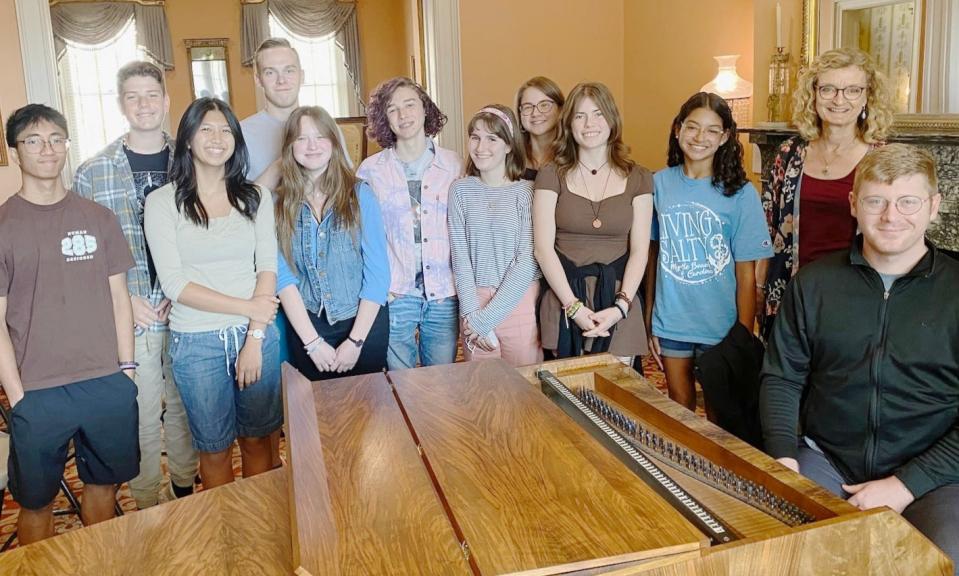With the right instrument and the right music, you can actually hear history
- Oops!Something went wrong.Please try again later.
The beautiful notes of Joseph Haydn and Wolfgang Amadé Mozart filled the Miller House parlor last weekend as Daniel Adam Maltz, a fortepianist based in Vienna, Austria, performed for the Washington County Historical Society.
Maltz played on a modern replica of a historical 1792 fortepiano, which travels with him for his more than 50 performances a year.
“It’s a joy when I have the opportunity to play in historic places like here at the Miller House because this is how music was experienced,” he said during an interview with the society.
Hearing Maltz play a fortepiano in the Miller House parlor was a chance to experience music as it was heard in the past. Maltz’s performances demonstrated how live music sounded at the time William Price originally built the Miller House in 1825.

While there are no records of William Price owning a fortepiano, Washington County’s wealthy could afford such an instrument in the 1820s. Hagerstown merchants such as Parker Blood (1800-1832) sold fortepianos and other musical instruments from their shops along West Washington Street. In 1823, a music teacher named John Krauth advertised piano forte lessons in Hagerstown’s Torch Light & Public Advertiser for interested ladies and gentlemen.
One wonders how many party guests William Price invited to the Miller House to listen to pianists perform the same works by Haydn and Mozart that Maltz plays today.
Made by Paul McNulty, Maltz’s fortepiano is historically accurate, constructed of wood from the same forests where original Viennese piano makers got theirs. The leathers used for the fortepiano’s hammers came from a sheep farm in Germany that hasn’t crossbred its flock since the 18th century.
These details bring modern listeners close to hearing what Mozart’s instruments sounded like when they were built. “I’m so thankful that people are out there who care that deeply about historical accuracy," Maltz said, "because it allows someone like me to come in and paint that picture.”
Maltz was born in a small town in South Carolina. His parents, both musicians, instilled in him a love for music from a young age. He began playing music and studying composition at age 5. Beethoven’s symphonies were the first pieces that influenced him to pursue music.
Maltz specializes in Classical-era keyboard music, specifically Viennese Classicism. His interest in the genre was always strong, but his journey to becoming a concert pianist was “a long and bumpy road,” filled with the experiences, mistakes and surprises of a young musician.
After attending an arts-based high school, Maltz pursued musical experiences outside of college, moving to Australia at age 19 to study under Gil Sullivan, a concert pianist and Mozart specialist.
He later found himself drawn to the heart of classical music — Vienna, Austria. “I had no plan. I had no money,” he said. “I just knew that I had to be in Vienna. I knew that I loved Classical-era music. I knew that I loved Haydn, Mozart and Beethoven, and by walking the streets of Vienna, by experiencing their culture and philosophy, speaking their language … I could really gain an artistic insight into this music.”
Vienna’s culture and the support of his partner, Renée, were catalysts for Maltz’s career. While studying at the University of Music and Performing Arts Vienna, Renée encouraged Daniel to take a historical keyboard instruments class.
Although he was a modern pianist, Maltz soon found his passion for playing the historical fortepiano. He credits Renée for the turn his life took and for encouraging him to channel his energy into making his dream a reality.
Maltz pursued his love of historical keyboard instruments to London, where he completed a masters program at the Royal Academy of Music and eventually began performing as a concert fortepianist.
With a demanding tour schedule, he and Renée travel the country, transporting the fortepiano from venue to venue. Pre-concert, Maltz wheeled the fortepiano on a dolly through the Miller House garden and into the parlor, assisted by WCHS Executive Director Andy Stout. After attaching the instrument's five legs and tilting it into a standing position, Maltz quipped that “it’s quite portable, but still annoying!”
Despite the toil, endless tuning and maintenance, Maltz has found a true connection to his career, which allows him to share the joys and beauty of the era's music with people across the country.
“To be able to take this thing that I care very deeply about and share it with people and see their first time discovering that sound … to take the philosophies behind the art that I love so much and to somehow share it with people … makes all of the other painful logistics worth it,” Maltz said.

During his time at WCHS, Maltz did plenty of sharing. On Sept. 1, he met with 10 students from the Barbara Ingram School for the Arts at the Miller House, demonstrating techniques and playing music. Several students even tested Maltz’s fortepiano themselves, exploring its sound and its sensitive keys — which are 10 times lighter than a modern Steinway piano.
“In the 18th century, people compared musicians to an orator giving a highly articulated speech,” Maltz explained. The fortepiano expresses meaning, emotion and everyday life, as our own speech does.
Check out Daniel Adam Maltz on his website, www.danieladammaltz.com, and social media.
And be sure to follow the WCHS on Facebook, Instagram, and our website, washcohistory.org. We are excited to continue offering historical events, including our upcoming Antique Treasure Show on Sept. 23.
Abigail Koontz is curator and programs manager for the Washington County Historical Society.
Journey to a distant past: Love caves? Here's how local history went underground with the Hagerstown Grotto
This article originally appeared on The Herald-Mail: Miller House treats music lovers to a concert on a replica fortepiano.

